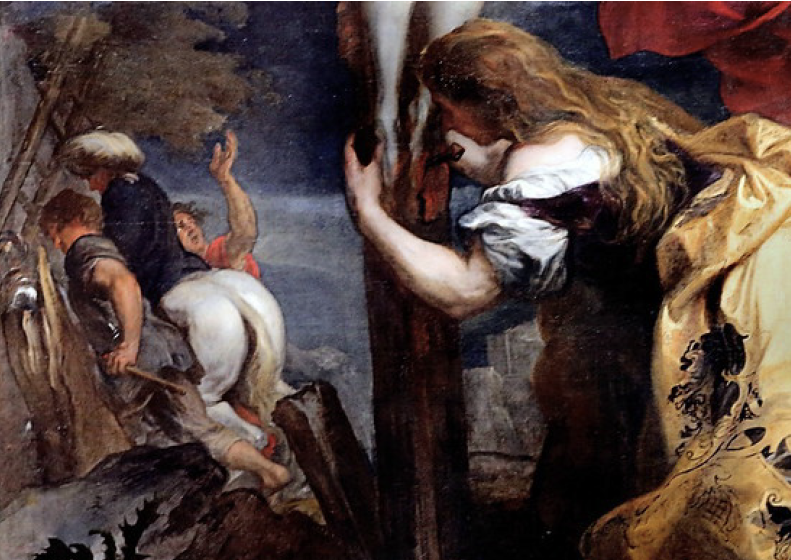The following is the second of a two-part series. The first can be found here. The entire article appears in Issue 22.1 of the Journal for Cultural and Religious Theory.
The Morality of the Bible
Spinoza thus describes two different kinds of representative cognition. On the one hand a cognitio ex signis always remains inside the limits of the imaginatio without ever reaching a mathematical certainty. On the other hand, a cognitio ex signis is instead guided by the principles of the intellect.[1] Both utilize signs. In the first case, while expressing a reference to things, it reproduces in memory (part of the imaginatio) the order proper to the human body.
In the other case, the order belongs to nature. Given the existing diversity between human bodies, the first order is different for every person. Indeed, while the object of the intellect, ie., the truth, is univocal, the imaginative ideas are conceived by each person in a different way. Thus, it is hard to find consensus. At the same time, however, the imaginative ideas are more easily reached. They are the most spontaneous form of knowledge and are accessible by everyone.
As already mentioned, the prophet speaks by virtue of a merely moral certitudo and not by virtue of a mathematical certitudo. In fact, the previous paragraph has shown that for an individual who is using only his imagination, it is impossible to obtain the kind of knowledge which belongs only to rigorous intellectual research. Given the definition explained in the preface of Ethica IV of good (evil) as that which does (does not) conform to any given human end, we can safely claim that morality, understood in this way, is merely an imaginative way of thinking. Indeed, different individuals can have divergent goals only when they are reasoning according to the order of their variously disposed bodies.
Otherwise, they would recognize the fact that Nature or God has no ends but is a series of necessities. Again, the idea of contingency is involved only on an imaginative level. It does not pertain to the actual order of Nature.
Hence, the prophet speaks thanks to a moral certitudo because his words aim at a specific end. Specifically, Spinoza asserts that the Pentateuch is written to inspire iustitia et caritas, the virtues required for the construction of a stable state of which is the necessary condition for the well-being of bodies. The aim of the prophets’ teachings is intimately related to the contingent order of our bodies. Their morality is a morality of bodies in so far as it is realized through the bodily faculty of the imagination and as it aims at the welfare of the bodies.
In TTP III, Spinoza clearly shows how Jewish laws, especially the ones traditionally attributed to Moses, were excellent in that upon them was constructed a state very resistant against natural accidents and protective towards its citizens. Spinoza asserts that there are three ways in which people can reach happiness: having an adequate knowledge of God, having power over their passions, and living a safe life. While the first two are dependent only on the person’s own characteristics, the third is explicitly related to how the state in which the person lives is governed (TTP III, 5).
Knowing God is nothing else but the Amor Dei Intellectualis, which is fundamentally a private matter and involves only a relationship between the person and God (or Nature). This relationship should not imply the intercession of any other person, especially not of religious authorities. Similarly, the ability to dominate one’s own passions is strictly founded on the freedom of the individual to cultivate one’s own personal growth without external impositions. On the contrary, if human beings do not work together and learn to live peacefully in a well-governed state, it is impossible for them to have a safe life.
That is, it is impossible for them to defend themselves against the dangers of nature and to employ its potential to satisfy all people’s needs. The state performs its function in the best possible way only if equipped with a good legislation. In his analysis, Spinoza is ambiguous on what was the true cause of the Jewish state’s fortune. On the one hand, it seems that the Mosaic laws were rationally advantageous. On the other, it seems that the Jewish state was able to last for such a long time only thanks to external conditions rather than by virtue of its legislative structure. Regardless, in both cases the main aim of the state remains to provide the best conditions for the individual’s safety and the well-being of the body.
It is for this reason that iustitia et caritas are fundamental virtues: if people are not animated by these intrinsically social qualities, they are not disposed towards caring for the well-being and safety of others. Again, it is only in a social situation that we can achieve and maintain the well-being of our body: without other people, it is harder to preserve our bodies both because our power in harnessing natural resources and defending ourselves against external perils is augmented by the union with others and because the others, if not bound by society’s rules, may become a source of harm for the individual.
The capacity of the prophet to inspire iustitia et caritas in people is not secondary. If the prophet can make people behave correctly through the images he constructs then he is the indirect cause of a safer state. The truth of these imaginative tales is not important because their aim is not to achieve any speculative truth about the nature of things. Rather, seeing as their aim is to inspire specific moral virtues in the most amount of people, they must be intuitively convincing and immediately understandable to everybody.
As Spinoza claims in TTP V, the Bible is nothing more than a collection of tales but it can be successful in achieving its goal. That is, it can make people care for each other in order to establish over their correct behaviour a strong and just political state not by providing them with rational and adequate knowledge of things, but through suggestions evocative of a rhetorical use of words and signs.
In contrast with the Maimonidean conception of the Bible as a book filled with hidden speculative truths accessible only to the few elected people who are capable of overcoming surface contradictions and ambiguities, Spinoza strongly asserts that it is not the role of religion in the sense of any institutional faith, to explain or better dictate what is true and what is false. On the contrary, the activity of properly discovering the truth belongs only to the individual mind, which enables everyone to autonomously embark in this research (TTP I, 2-3).
According to Spinoza, the signs employed in the Bible are related to the kind of cognitio ex signis, which remain only inside the boundaries of the imagination without having been verified by the adequate ideas of the intellect. Its knowledge is exclusively based on opinion instead of on mathematical certitudo; that is, the repetition of already-held beliefs which cannot be interpreted through the reconstruction of rational links between one sign and the other as the process of the ratio requires. If the biblical signs are spoken through a moral certitudo, their interpretation must be structured taking this into account.
Thus, they should necessarily be interpreted through an arbitrary sign. This link is only motivated by a practical end because this kind of cognition ex signis is one that remains inside the boundaries of the imagination. Essentially these signs must be used and interpreted according to the realization of the moral goal.
The Bible according to Spinoza is perfectly adequate for its original moral end: inspiring virtues without conveying any truth. However, as previously mentioned, there remains a problem related to the diversity of imaginative representations between different people. Given the contingent and imaginative structure of moral reasoning and given that different bodies are structured differently, it follows that there is no unique meaning which is unmistakeably recognizable by everyone and attached to any given sign.
In other words, given the contingent order of my body, it is possible for me to grasp the meaning behind an example in a very different way than someone else would if the example does not follow the strict necessary reasoning which belongs to the ratio (in which case it would be a demonstration and not a rhetorical example). However, given the nature of morality, it is necessarily related to this imaginative way of thinking.
This is the reason behind the digression in TTP XII about the use of biblical text. While Spinoza is demonstrating that what is important about the Bible are not the exact words used but their implicit goals, he writes: Verba ex solo usu certam habent significationem, & si secundum hunc eorum usum ita disponantur, ut homines eadem legentes ad devotionem moveant, tum illa verba sacra erunt, & etiam liber tali verborum dispositione scriptus (TTP XII, 5)[2].
The signs in a merely imaginative scope do not have a necessary link to their meaning. [3]It is on the interpreter to reconstruct the context in which those words are said to understand their original meaning[4] or (and this is the significance of the latter part of the quotation) to use these words to inspire in himself or in others iustitia et caritas.
The Corporeal Good and the Amor Dei Intellectualis
It seems that Spinoza distinguishes between two different kinds of good: a moral good that is involved in an imaginative knowledge of the reality, and the highest good that consists of the adequate knowledge of God or Nature. This latter is an intellectual end. What is required is a mind apt to conceive the true nature of God, while as was shown, the moral, imaginative good is essentially related to the body.
According to Spinoza, reaching the highest good is a form of love towards God (TTP IV, 12), the Amor Dei Intellectualis, and it is deeply related with being happy. Since the Tractactus de Intellectus Emendatione, the intellectual path designated is a path towards our true happiness. We should be taking care of our intellect in such a way that this faculty is not driven by passions but uses passions to recognize the union between the mind and the rest of nature (TIE, 11-12). The highest good consists in recognizing that we are participating in an eternal, necessary sequence of events, i.e., participating in an awareness of the eternal nature of God and thus maximally satisfying our cupiditas sese conservandi: the force which moves us to preserve ourselves. In this force, we use all our intended power as the possibility to act.
However, the way in which this path is articulated changes through the Spinozian work. If in the Tractactus de Intellectus Emendatione the mind is autonomous and self-sufficient in this research, it may be argued that Spinoza later modifies this conception and considers the material and social conditions in which the individual finds herself. This is not only a possible support for reaching the highest good but also a decisive factor of success in this intellectual goal.
If this is the case, the two distinct goods are neither exclusive nor opposed. If a bodily morality is principally constructed on the will of preserving peoples’ safeness and freedom through a regulation of interpersonal relationships, then it is the pre-condition for having the possibility of access to the highest good. The prophetic activity, although deprived of every authority regarding the truth, can be a means by which the truth is accessible. The mature Spinoza seems to be more concerned about how the surroundings in which the mind operates are structured: iustitia et caritas aim not only at the material welfare of people but through this they aim at the flourishing of individual minds, and so at their highest good.
I adopt here the instrumentalist view of prophecy by Sangiacomo.[5] According to him, Spinoza considers the Bible as «conducive to establishing a practice that is consistent with reason and leads to the creation of material conditions for the flourishing of the mind’s power of thinking» (ibid, 86). This consistency cannot be on a rational basis. It was already said that Spinoza excludes completely whatever rational certainty is derivable from prophetic words.
However, «the agreement between the moral teachings found in Scripture (conveyed by prophetic law) and the dictates of reason (expressed by natural divine law) do not consist in an agreement concerning their content but rather concerning their effects. Prophetic divine law agrees with reason not because it commends what reason commends. It is because prophetic divine law is capable of creating appropriate conditions for the flourishing of reason and thus for the achievement of the Supreme Good commended by natural divine law» (ibid, 88).
It was shown in Section 2 that the potentia of the imagination is a prerequisite to develop the adequate ideas of the intellect. But the potentia of the imagination relies on the disposition of our bodies. Some bodies are more favoured than others in producing a great variety of images for comparison, but in any case, having control on what affects in a positive or negative manner the disposition of the body can have an important impact on our capacity of reaching an adequate idea of God. The Bible may be used to exert this control on the external condition though it cannot directly help the intellect in reaching adequate ideas.
It is important to stress that these external conditions are also eminently social. If the mind in the production of the adequate ideas is in a fundamentally private dimension, the external situation which can foster this research relies on a social harmony. At the beginning of the Tractactus de Intellectus Emendatione, Spinoza describes the highest good as first taking care of our own intellect and only then helping as many people as possible to take care of their own, i.e., structuring the society to allow the flourishment of minds. This includes developing not only a strong moral, ethical theory but also a medical science. On the contrary, in the TTP it seems that this latter aspect is not an accessory and successive part of the highest good, but that this social concern stands between us and our happiness.
Conclusion
According to Spinoza, religion is exclusively based on a moral goal and is characterized by particularity and contingency. The necessary and the universal are features only of an intellectual cognition of God. Religion, in fact, derives from the imagination only. It has an essentially corporeal and practical core.
The idea of a moral use of the Bible thanks to its imaginative character already exists when Spinoza writes the TTP. However, the implicit theoretical structure at the basis of his argument changes the perspective about what prophecy really means. After having explained the exclusion of speculative learning from revelation and having described the articulation of its representative knowledge, it was shown that the semiotic knowledge conveyed through biblical text is strongly dependent on the intention, or better yet, on the singular structure and personal experience of the reader. A text like this could be said to be good or evil only according to its use by someone.
However, it has also been shown that reaching the highest good, a private matter, is based on the possibilities offered by the body and relies on a social and political stability. It is not possible to do justice to the complex goal that the highest good is, without recognizing the role that the body, through the social and material conditions in which it is situated, plays in favouring the access of the mind to a true cognition of God or Nature.
In this cognition, this perceiving sub specie aeternitatis, the individual recognizes herself an expression of the univocal substance which reality consists of: God. The awareness of being the cause of herself, not as a mode but as the substance, is the reason of the beatitude of the individual. In the moment thinking sub specie aeternitatis, the individual as subject and object, i.e., as an active agent and a passive one, coincides while being perfectly satisfied in her cupiditas sese conservandi.
Her body ceases to be just a source of power or a source of passions. It is also understood as a movement inside an absolute immanence. [6]Then the rejection by Spinoza of the speciality of the prophet returns: every person can potentially reach this state of beatitude because there is no transcendent being which intervenes in making people more or less sapient or blessed. The path which the individual engages with shows that the sacred is not something that must be looked for outside nature but is the immanent cause of everything.
Caterina De Gaetano graduated at Rome La Sapienza University, attends currently Milan State University and has made an Erasmus experience at University of Vienna. She has a specific interest in the modes of knowledge, both in traditional philosophy and in the interdisciplinary field of cognitive sciences. One of the major topic for her is the role of the body in shaping human experience and articulating the relationship between the individual and the world, the latter conceived in its broadest sense as the natural and social environment or the spiritual aspect of reality.
[1] Op. cit., 204-205.
[2] “Words acquire a particular meaning simply from their usage. Words deployed in accordance with this usage in such a way that, on reading them, people are moved to devotion will be sacred words, and any book written with words so used will also be sacred.” (Israel and Silverthorne, 2007, trans.)
[3] Mignini, op. cit., 207.
[4] This is why in the exposition of his historical-critical method for interpreting the Bible, Spinoza gives great importance to the context. Given that in the biblical text the signs are not part of a speculative argument, their meaning is not easily deducted from the text itself; rather, their meaning must be understood according to the author, i.e. not abstractly but according to what the signs represent for him and ow the relate to his end and.
[5] Andrea Sangiacomo, Spinoza on Reason, Passions, and the Supreme
Good (Oxford: Oxford University Press, 2019).
[6] Giorgio Agamben, “Absolute Immanence.” In Introduction to the Philosophy of Gilles Deleuze (London: Continuum, 1999), , 151–169.




